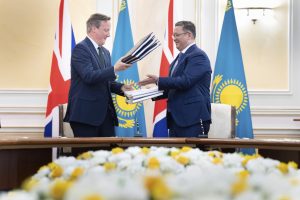Last week U.K. Foreign Secretary David Cameron completed a five-day tour of Central Asia and Mongolia. Cameron was not only feted with lavish welcome ceremonies but, judging by the attention paid to Cameron’s arrival and the deals announced, all sides came away with winning outcomes, singly and jointly. This whistlestop tour was intended to reflect the United Kingdom as a real partner of choice, an engaged partner, and one with considerable soft power assets.
For the U.K. there were concrete wins. Cameron promised to help the Central Asian countries and Mongolia with their development in areas of trade, investment, education, security, and climate change. The significant local press coverage around Cameron’s visit is also worth noting as it demonstrates regional openness. Central Asian countries are actively seeking greater contact with the outside world, and seeking to establish their own geopolitical position on the world stage. The high-level meetings and widespread local media coverage of Cameron’s tour suggests that expanding cooperation with the U.K. is much desired across the region, not only to help promote itself as an emerging significant political and economic actor, but to connect with a broader market.
On trade, Cameron announced a 50 million pound ($62.5 million) commitment of new funding over the next three years across the region. This includes a 19.5 million pound regional climate program and 6.5 million pounds for regional education programs.
On education, in which the United Kingdom enjoys a strong position relative to its rivals, Cameron announced a doubling of Chevening Scholarships, which are fully funded master’s degrees, to Kazakh and Uzbek students. Further he stated that the U.K. will provide English teachers throughout the region with access to English language teaching materials developed by the British Council.
From the perspective of the Central Asian nations, the U.K. is seen as a relative newcomer in the region and its trade and investment connections are limited compared to those of Russia and China. Nevertheless, the U.K. presents more choices for the Central Asian governments, local entrepreneurs, schools, and civil societies that would enable the region to break free from the Russia-led diktat.
With a booming and young population, the growing generational divide is inescapably moving the countries of Central Asia and Mongolia in the direction of their native language instruction or English language.
On security, Cameron emphasized the U.K.’s support to provide greater assistance with the Central Asian governments in clamping down on parallel trade and dual use goods that seem to end up in Russia. This support reflects the notion that the British policy community to an extent has coalesced around some fundamental understandings about Central Asia. Indeed, back in the U.K., Foreign Affairs Committee Chair Alicia Kearns expressed appreciation for Cameron’s tour and noted the region is of “growing importance.”
Indeed, the peoples of Kazakhstan, Kyrgyzstan, Uzbekistan, Turkmenistan, Tajikistan, and Mongolia have entered a different era in their histories. Since gaining their independence, they have marched to their own drummers, and danced to their own music. While external geopolitics have granted the Central Asian nations and Mongolia an impetus to explore Western options, the domestic developments might be the most important changes to the region’s relations with external partners.
Central Asia and Mongolia’s international relations are in flux. The string of meetings, memorandums and roadmaps signed between the U.K. and the states of Central Asia and Mongolia suggests that there is space to maneuver. One would hope that, with significant commitment on all sides, this U.K.-Central Asia-Mongolia renaissance is not just another false dawn prompted by the passing windfall of Russia’s invasion of Ukraine, but something solid and sustainable.
Independent analysts and policymakers should assess this trip in the context of the growing strategic importance that the Central Asian region holds, but which had long been overlooked. The mere fact of having many more choices in their external relations has provided the governments of Central Asia and Mongolia with some significant new or renewed leverage. Thus, Cameron’s trip opened a door that these countries have long been anticipating, as they proactively carve out their place in this dynamic world.

































